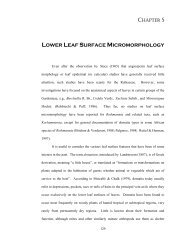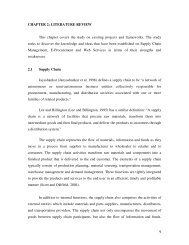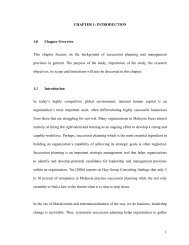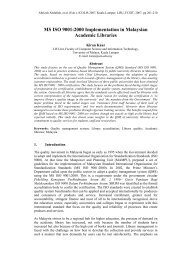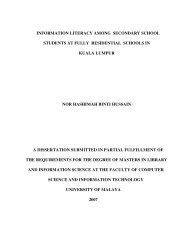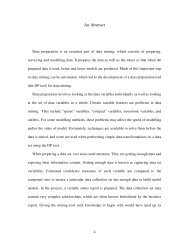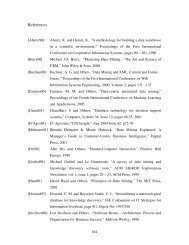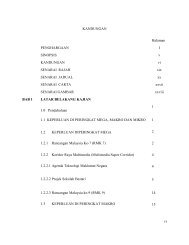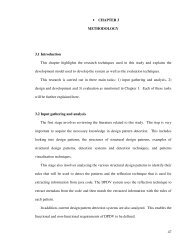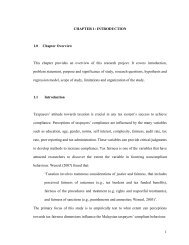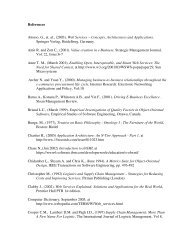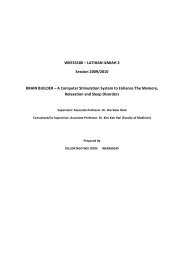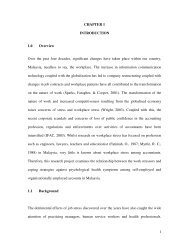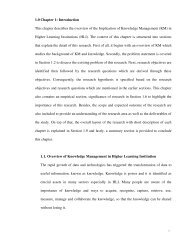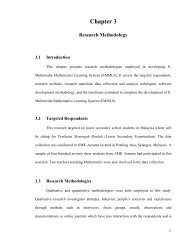Research methodology is the method, means or ... - DSpace@UM
Research methodology is the method, means or ... - DSpace@UM
Research methodology is the method, means or ... - DSpace@UM
Create successful ePaper yourself
Turn your PDF publications into a flip-book with our unique Google optimized e-Paper software.
inf<strong>or</strong>mation-rich cases which can be studied in depth. The sampling in th<strong>is</strong> study was<br />
selected based on <strong>the</strong> different background of participants towards RPG and h<strong>is</strong>t<strong>or</strong>y<br />
learning. Th<strong>is</strong> <strong>is</strong> to gain deeper understanding on participant‟s experience with different<br />
kind of background.<br />
3.4.2 Participants and <strong>the</strong> role of researcher<br />
There are three things that must be followed by <strong>the</strong> researcher bef<strong>or</strong>e conducting a<br />
qualitative study (Lincoln & Guba, 1985):<br />
1. The researcher must adopt <strong>the</strong> stance suggested by <strong>the</strong> character<strong>is</strong>tics of <strong>the</strong><br />
natural<strong>is</strong>t paradigm.<br />
2. Second, <strong>the</strong> researcher must develop <strong>the</strong> level of skill appropriate f<strong>or</strong> a human<br />
instrument, <strong>or</strong> <strong>the</strong> vehicle through which data will be collected and interpreted.<br />
3. Lastly, <strong>the</strong> researcher must prepare a research design that utilizes accepted<br />
strategies f<strong>or</strong> natural<strong>is</strong>tic inquiry.<br />
In qualitative research, <strong>the</strong> researcher aims to reveal how <strong>the</strong> individual creates, modifies<br />
and interprets <strong>the</strong> w<strong>or</strong>ld in which he <strong>or</strong> she find himself (Cohen & Manion, 1998). fur<strong>the</strong>r<br />
At <strong>the</strong> same time, <strong>the</strong> researcher‟s experience becomes a part of <strong>the</strong> research outcome,<br />
since particular researcher brings h<strong>is</strong> individual experience into <strong>the</strong> research situation<br />
(Berglund, 2006).<br />
3.4.3 Data collection techniques<br />
There are varieties of data collecting <strong>method</strong>s used in qualitative research. There are<br />
seven primary ways to collect qualitative data (Berg, 2001), such as interviewing, focus<br />
groups, ethnography, sociometry, observation, h<strong>is</strong>t<strong>or</strong>iography, and case studies.<br />
The most widely used data ga<strong>the</strong>ring techniques in qualitative research are interview and<br />
observation (Hazzan, 2006). These can be st<strong>or</strong>ed in videotapes <strong>or</strong> audio f<strong>or</strong>ms. The<br />
33



